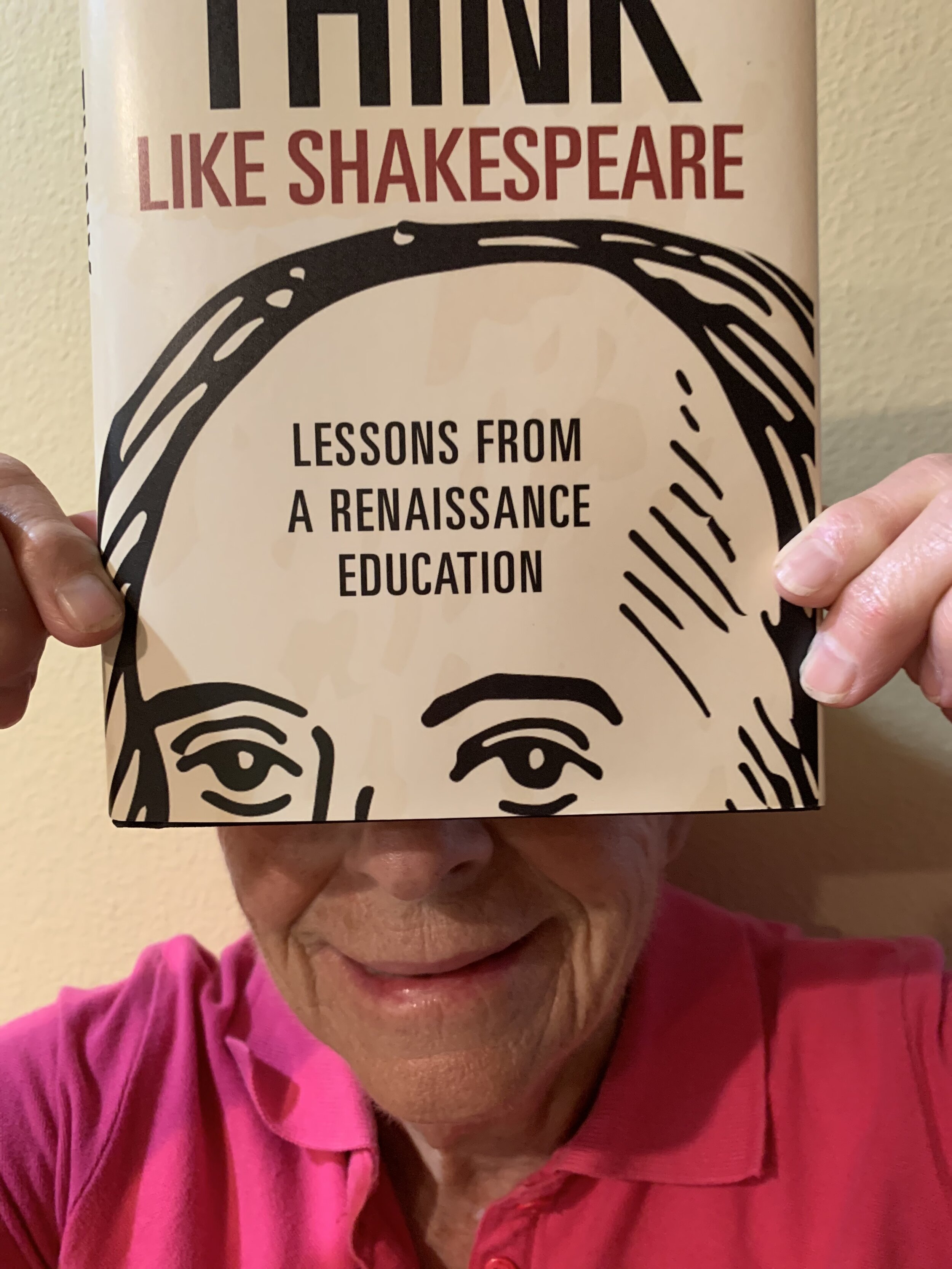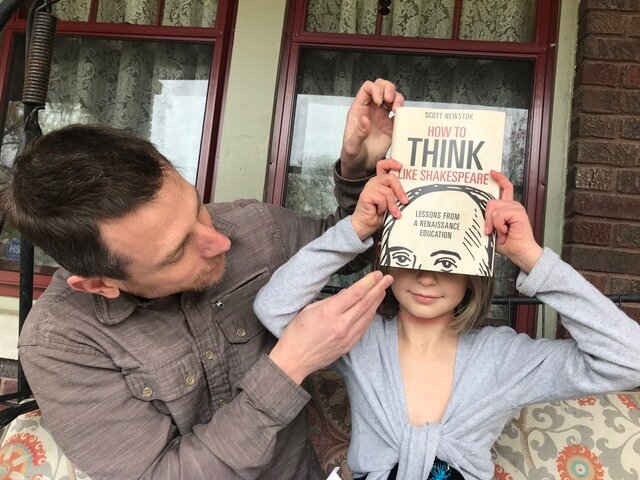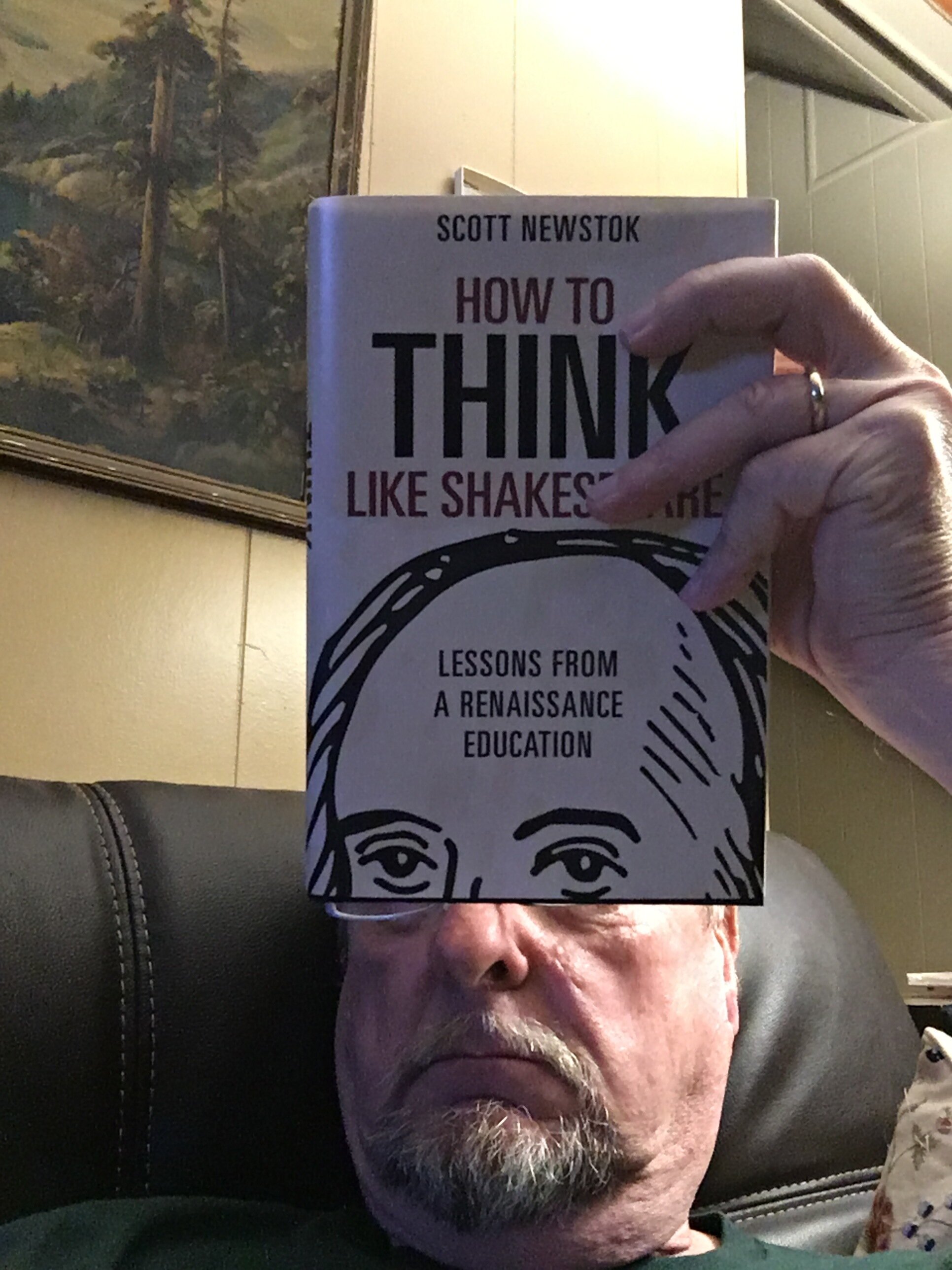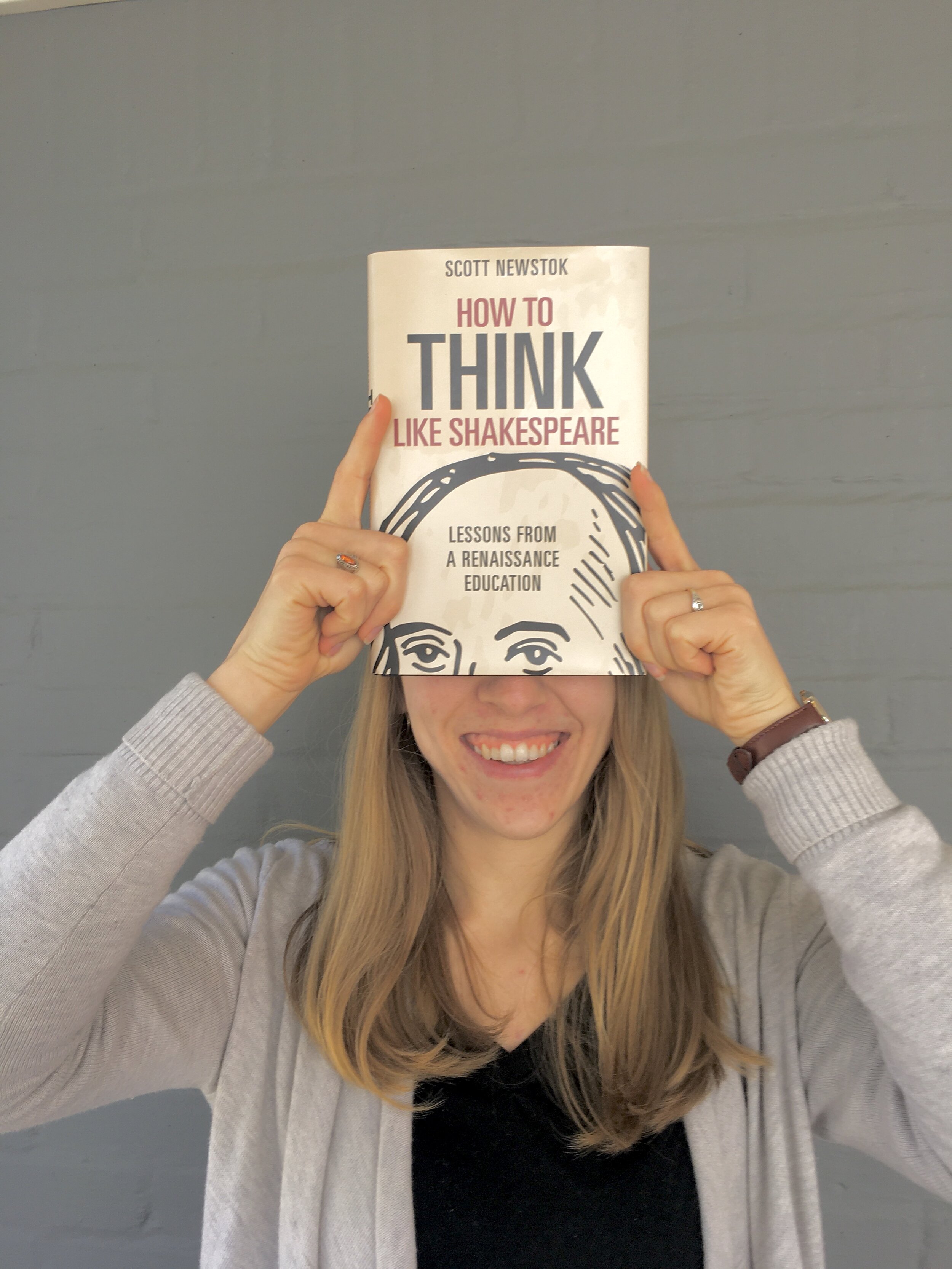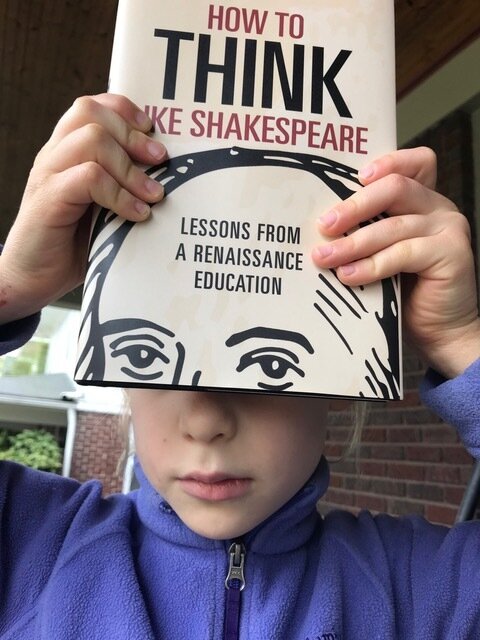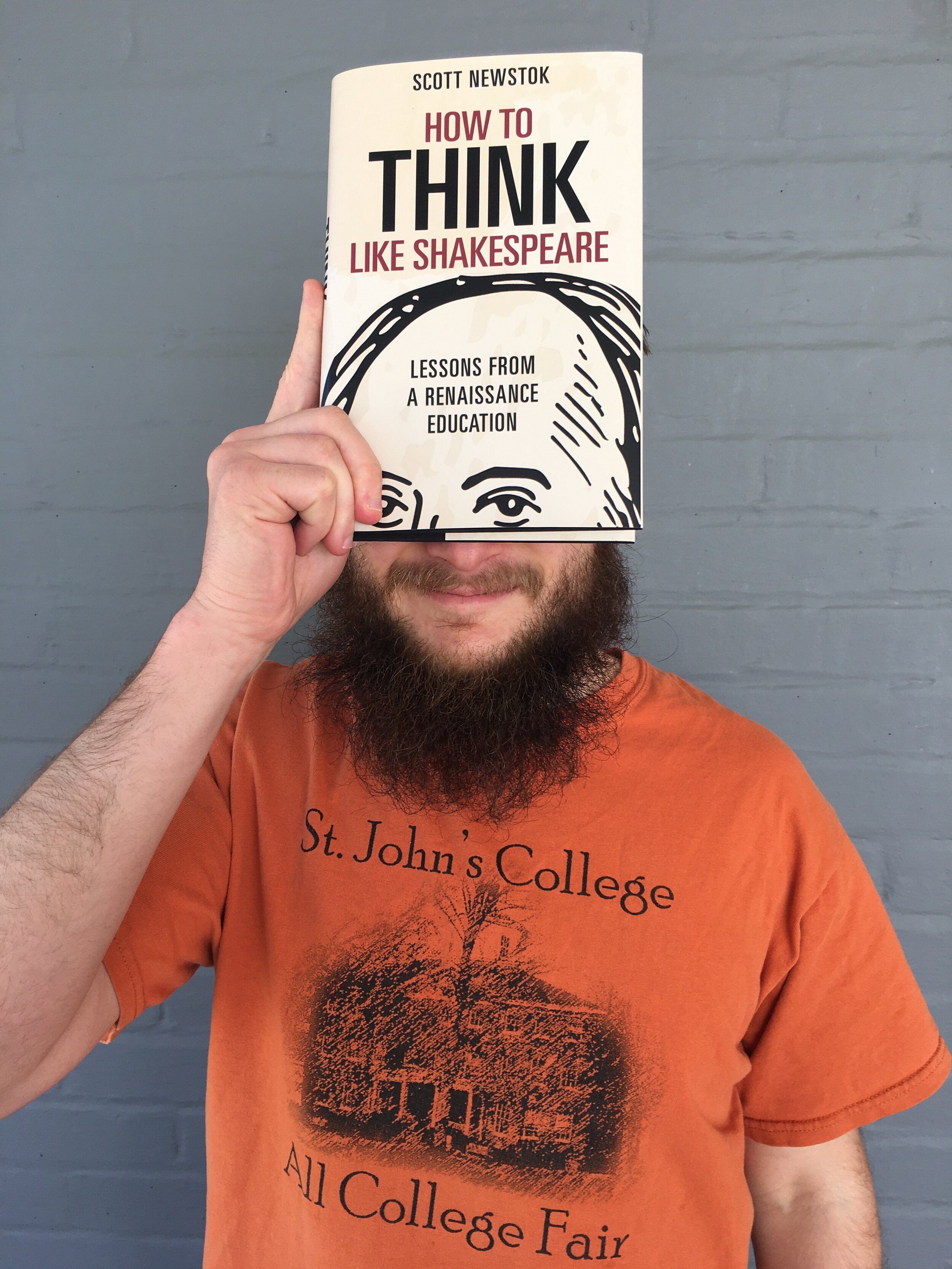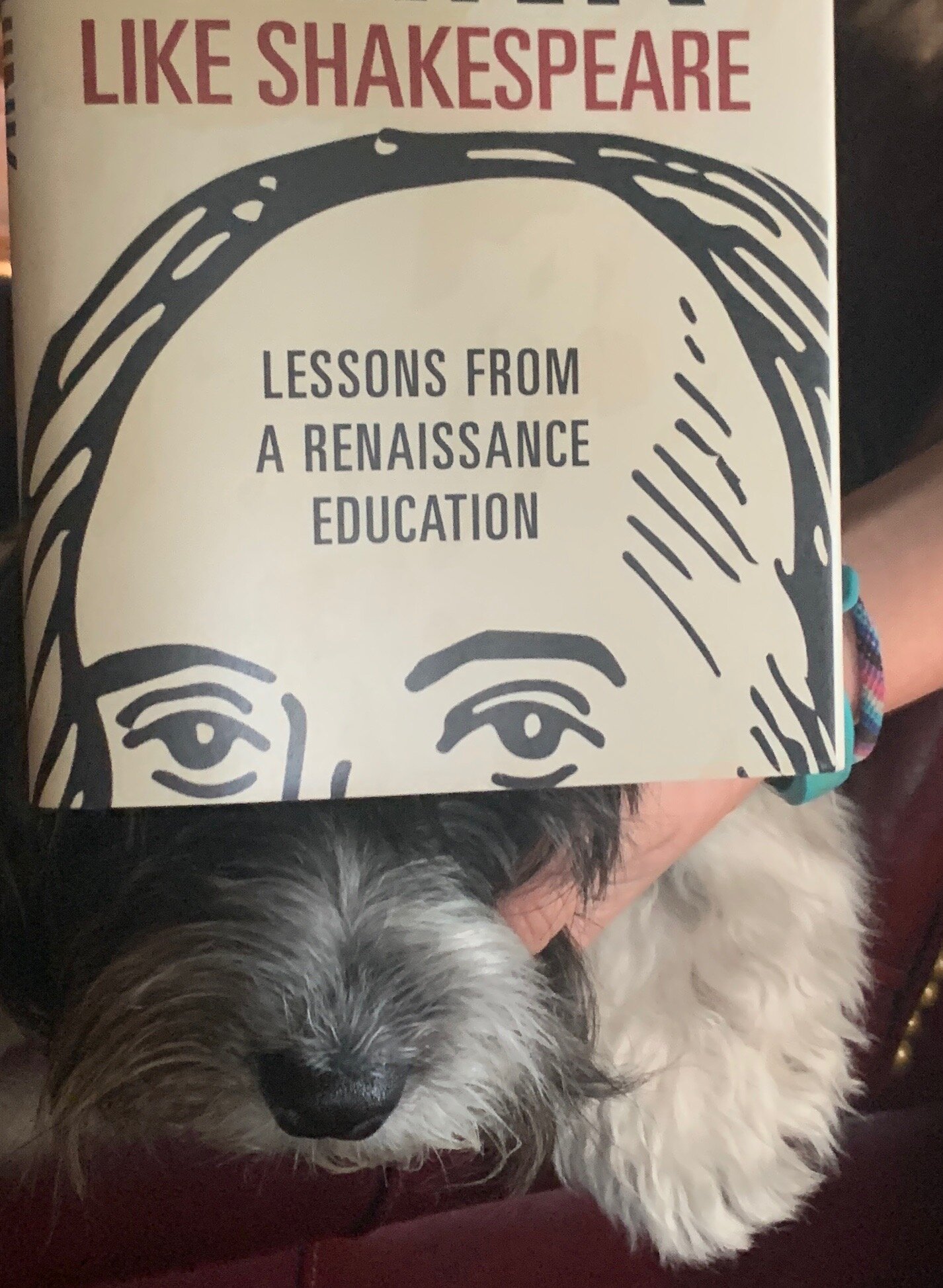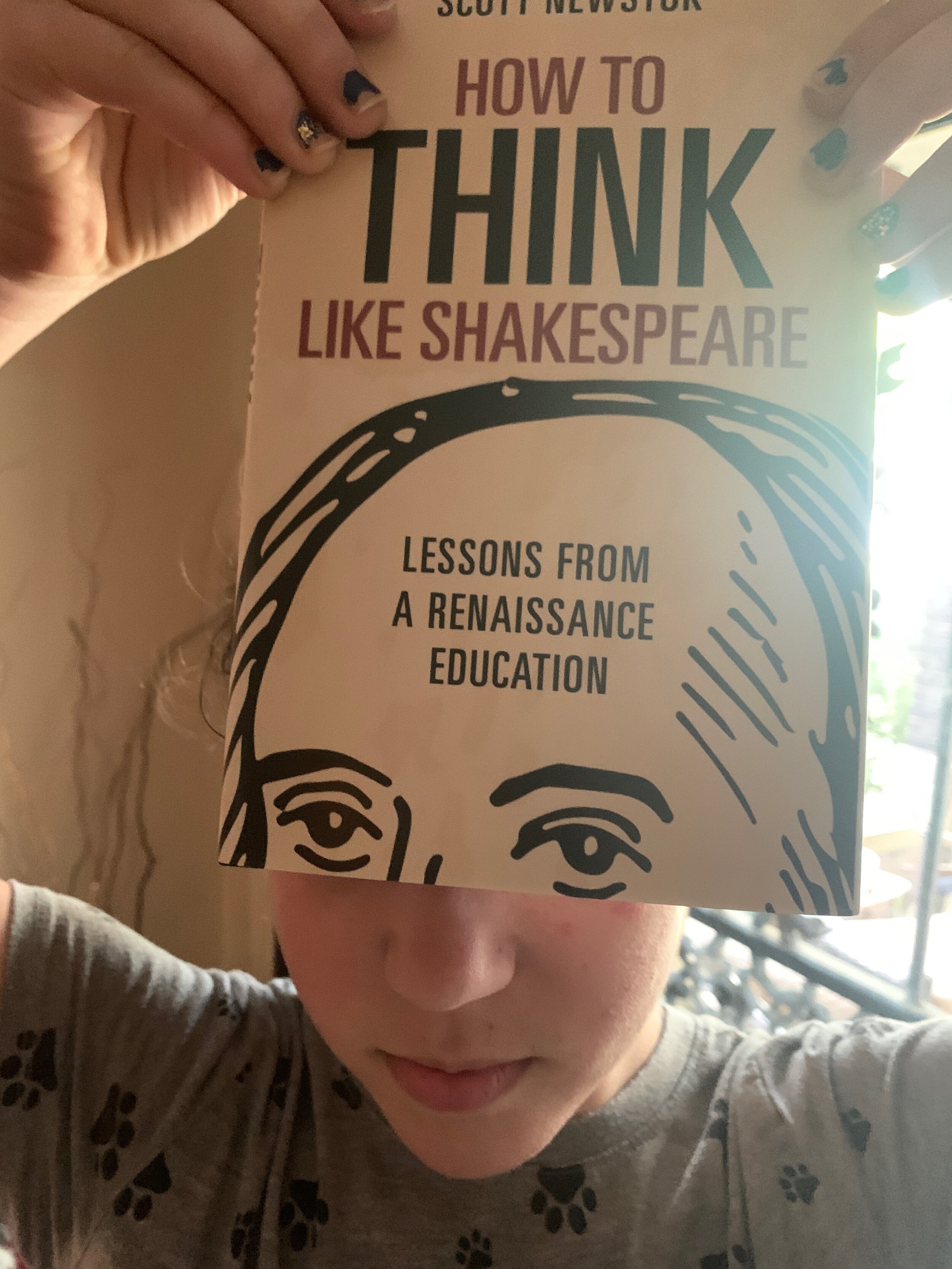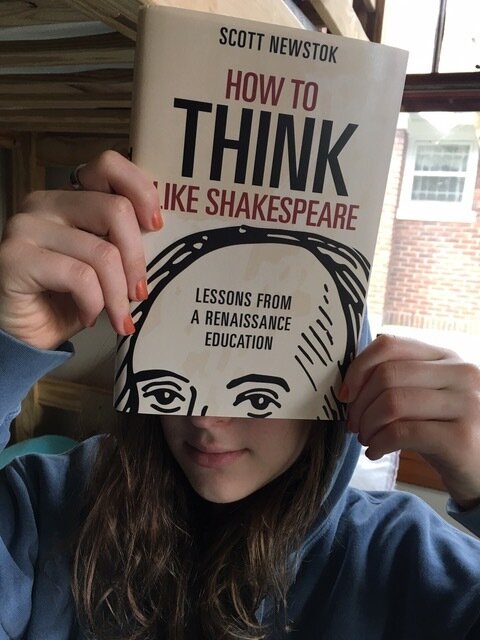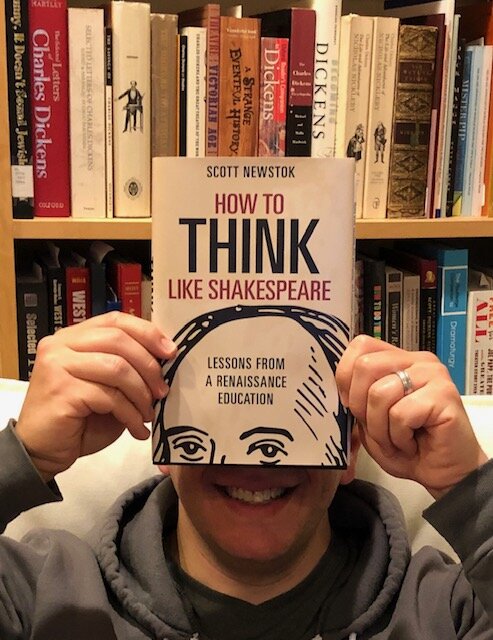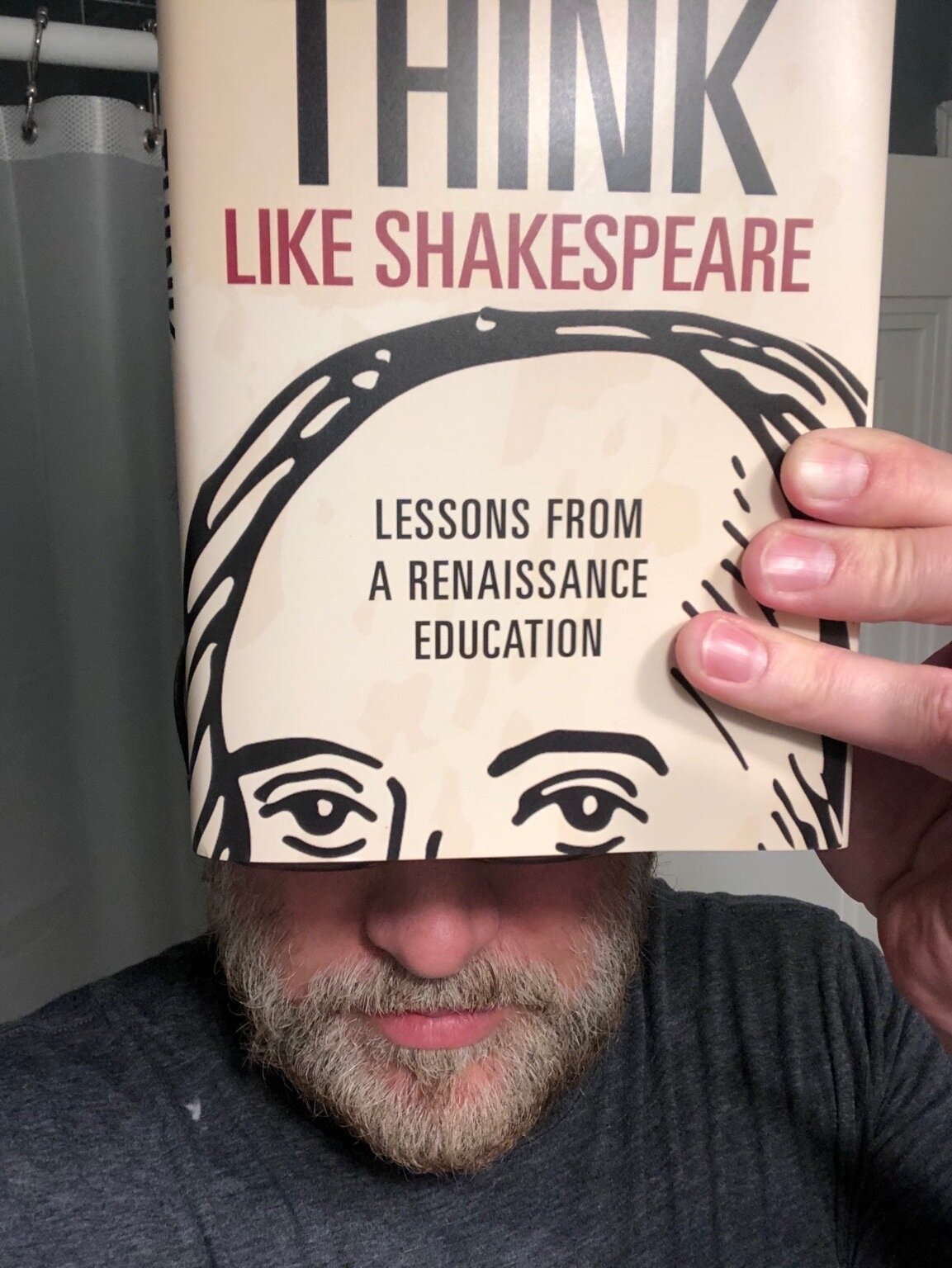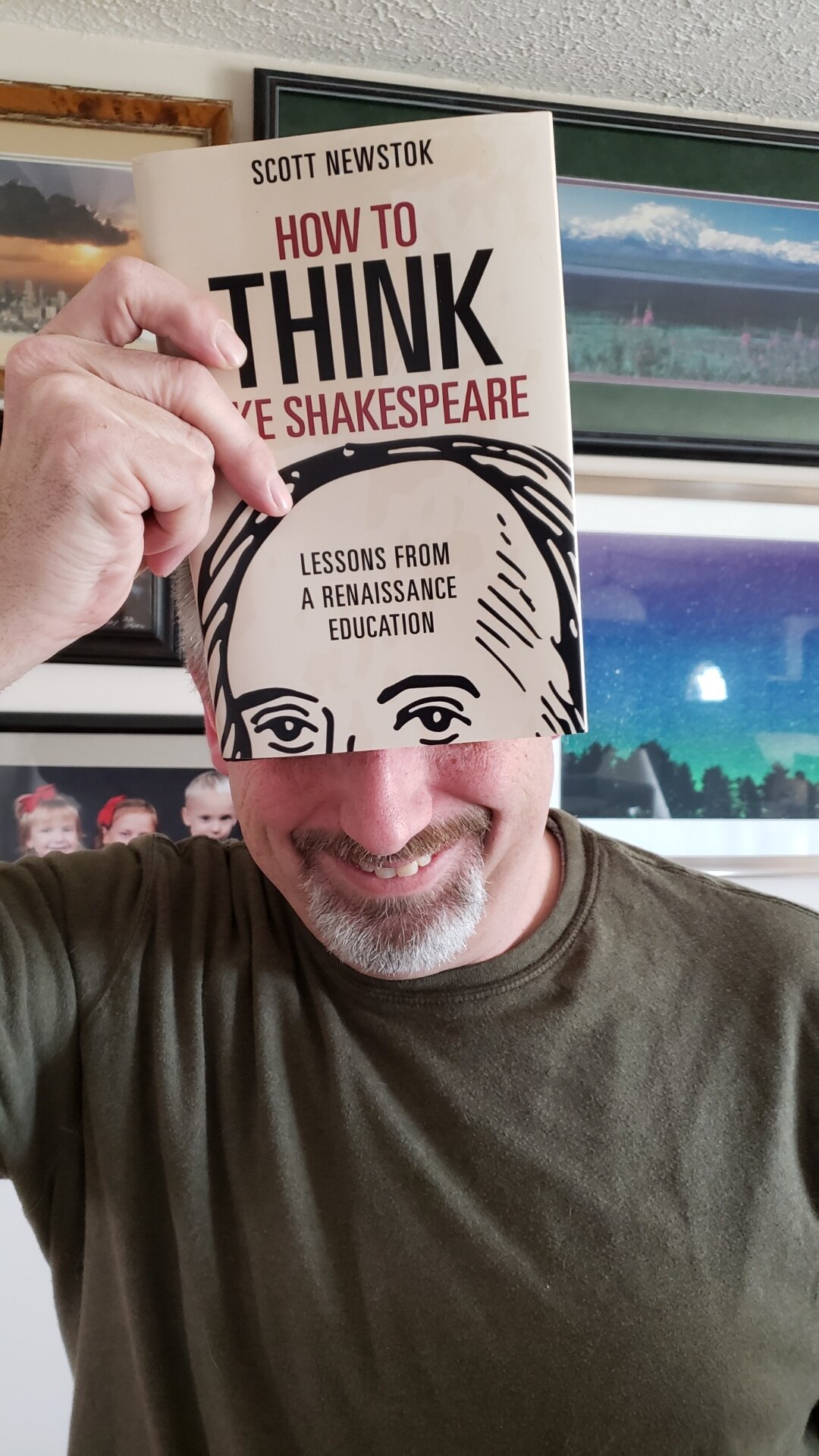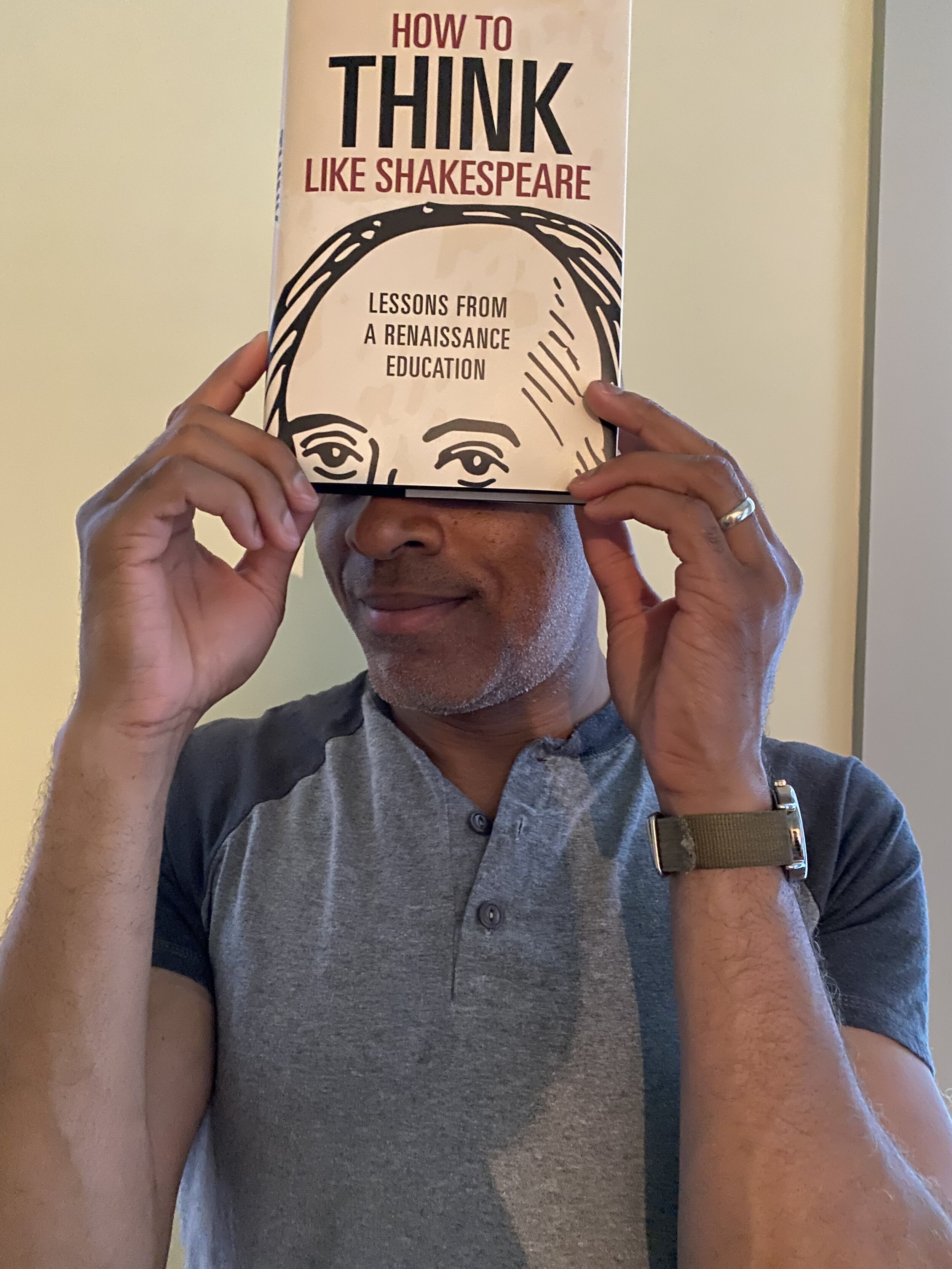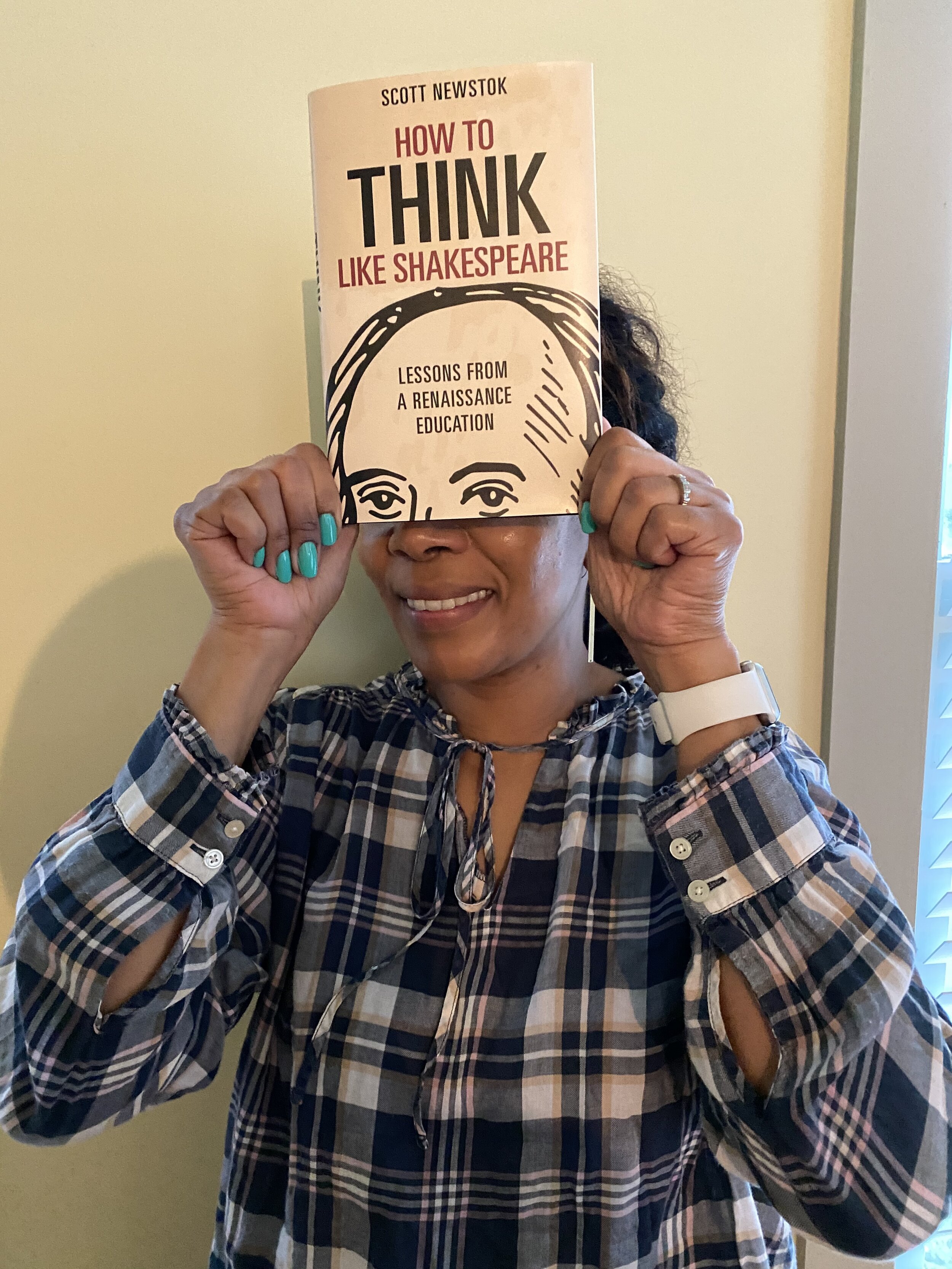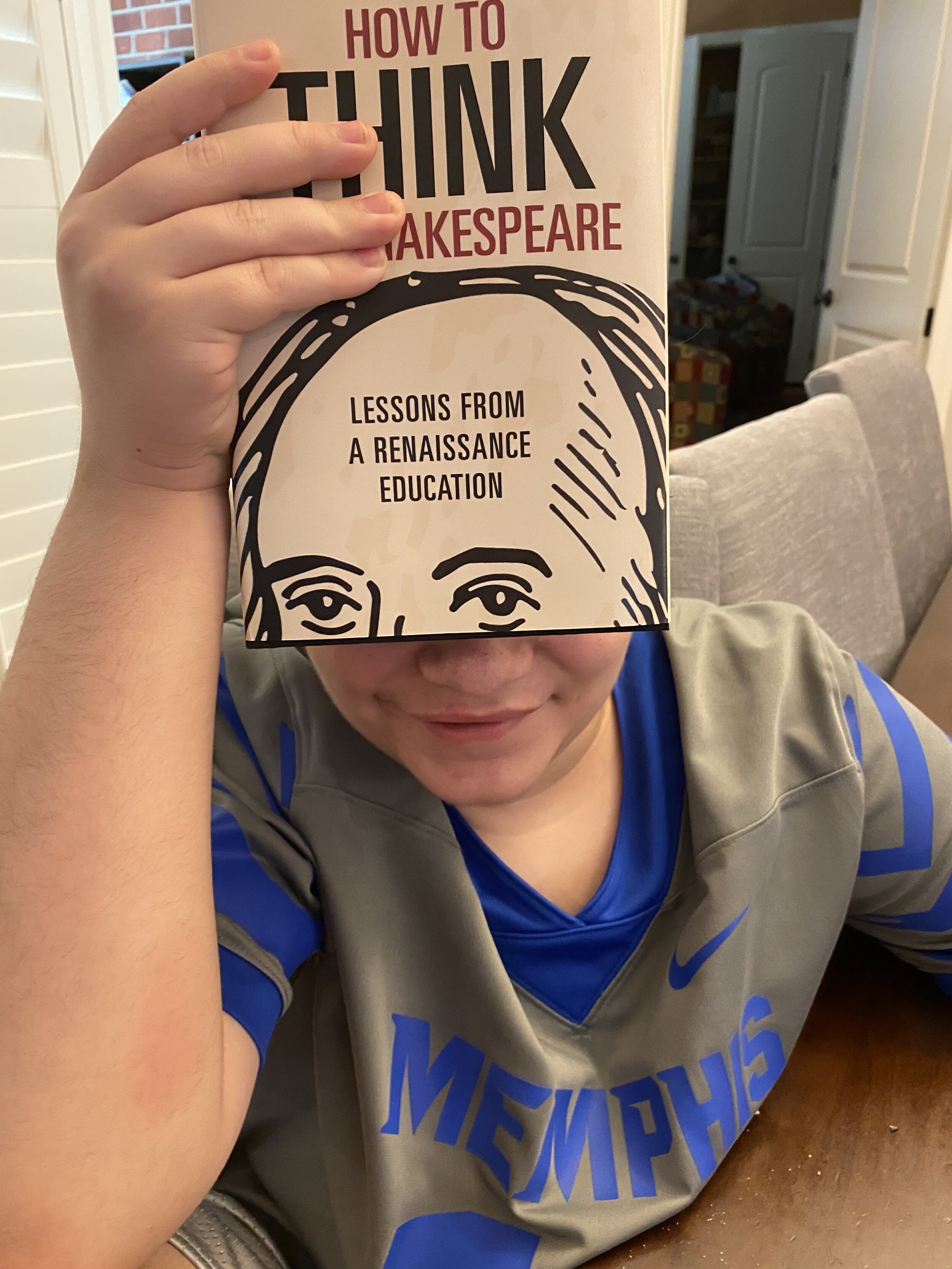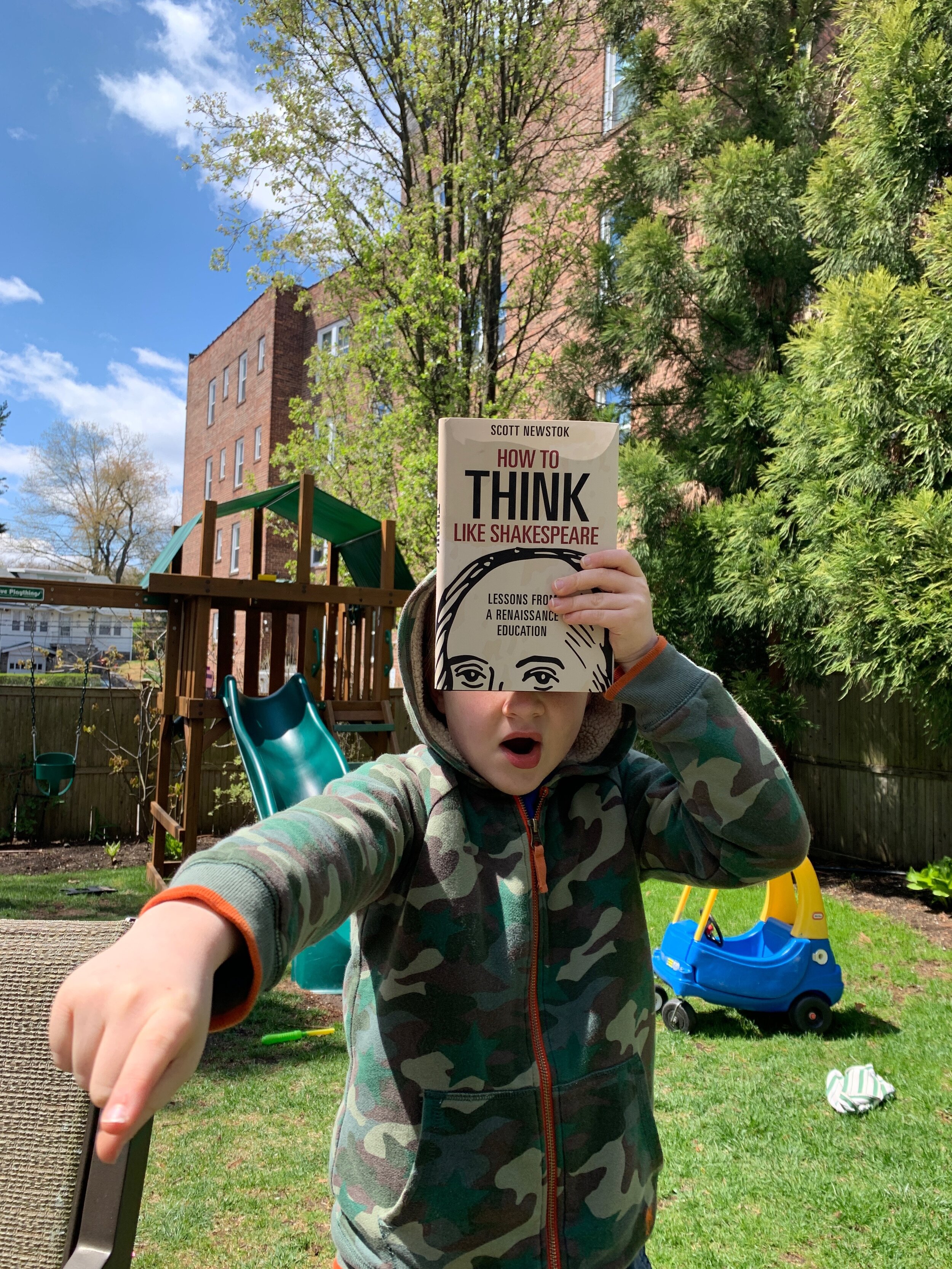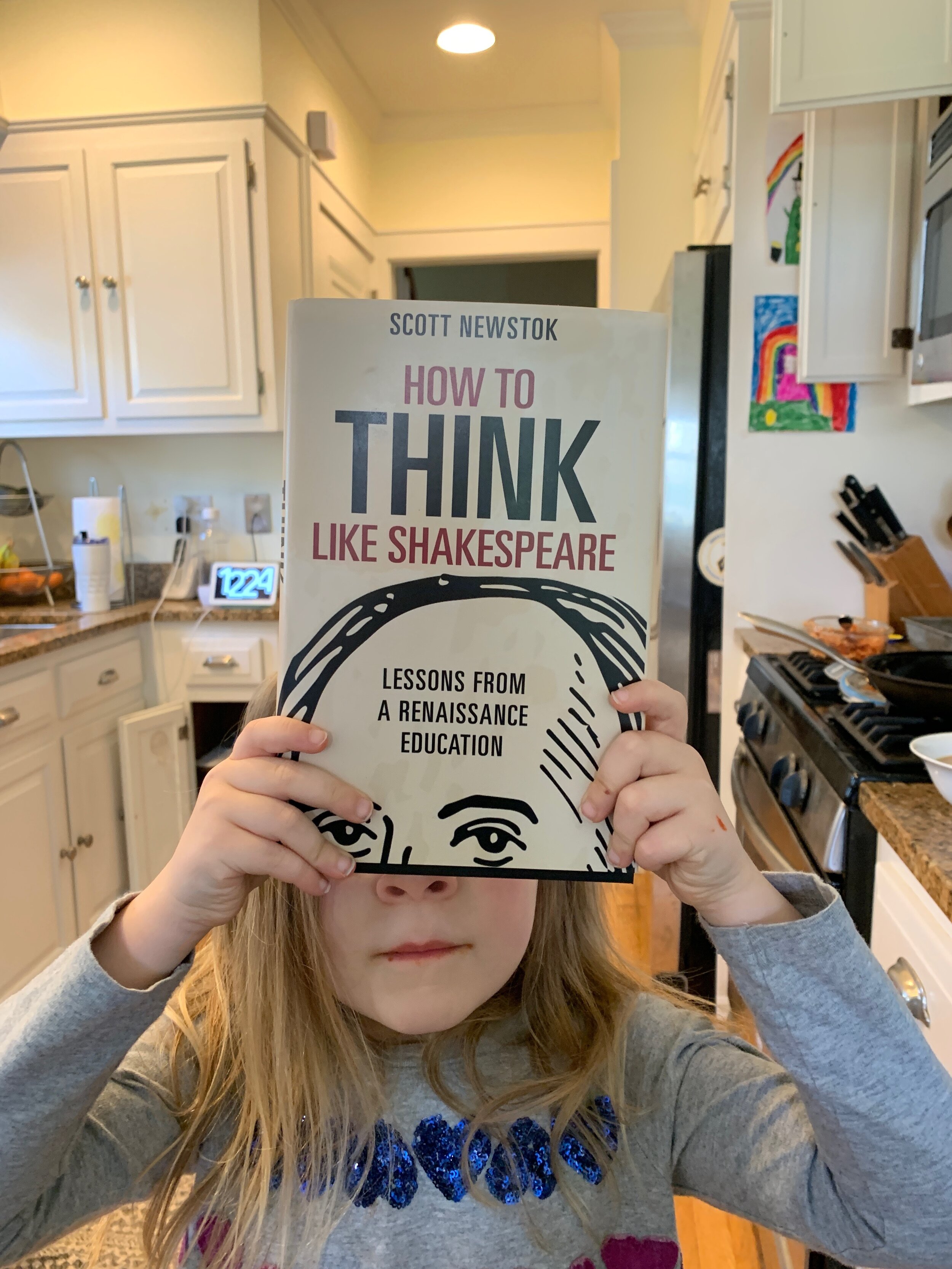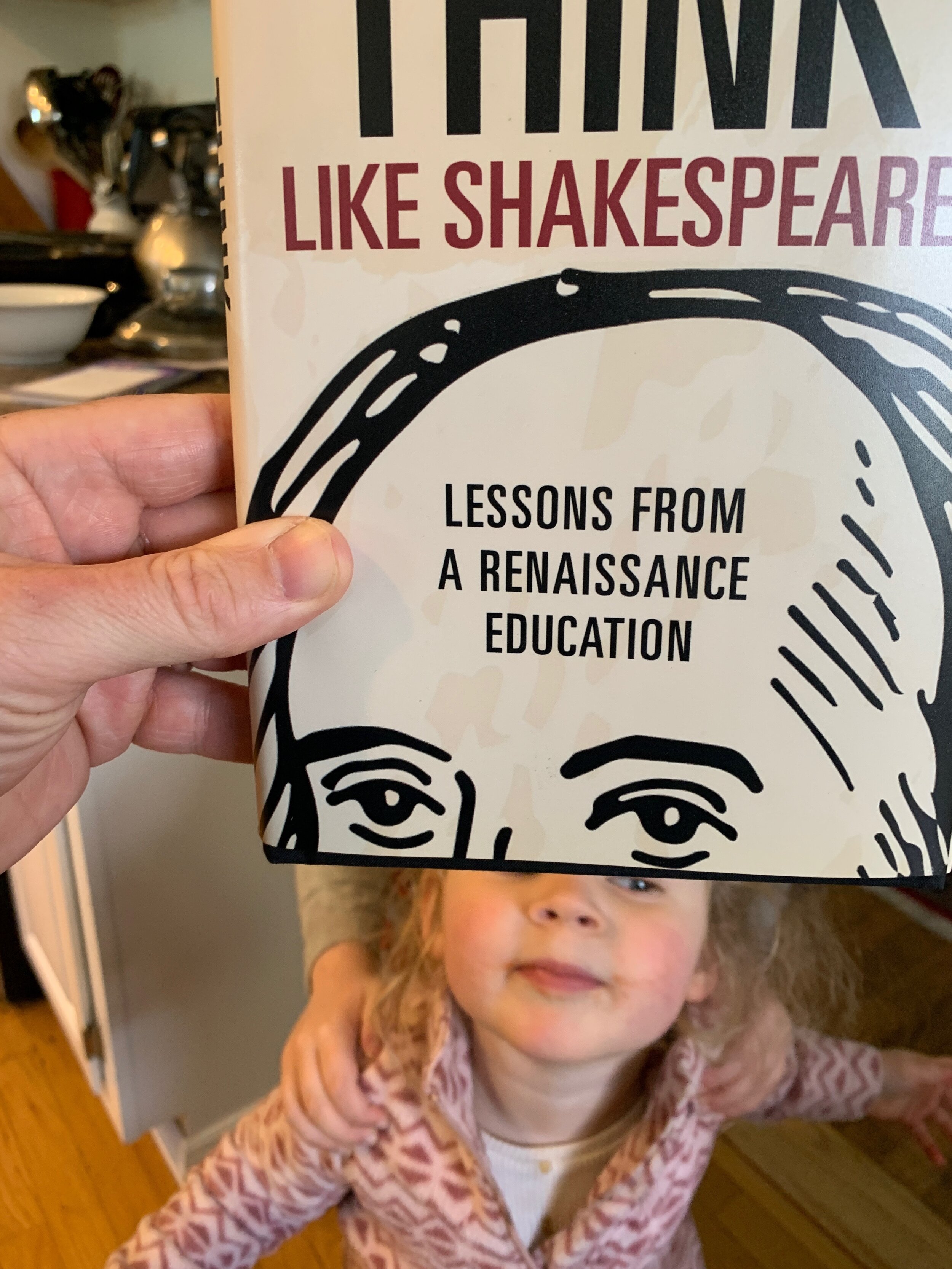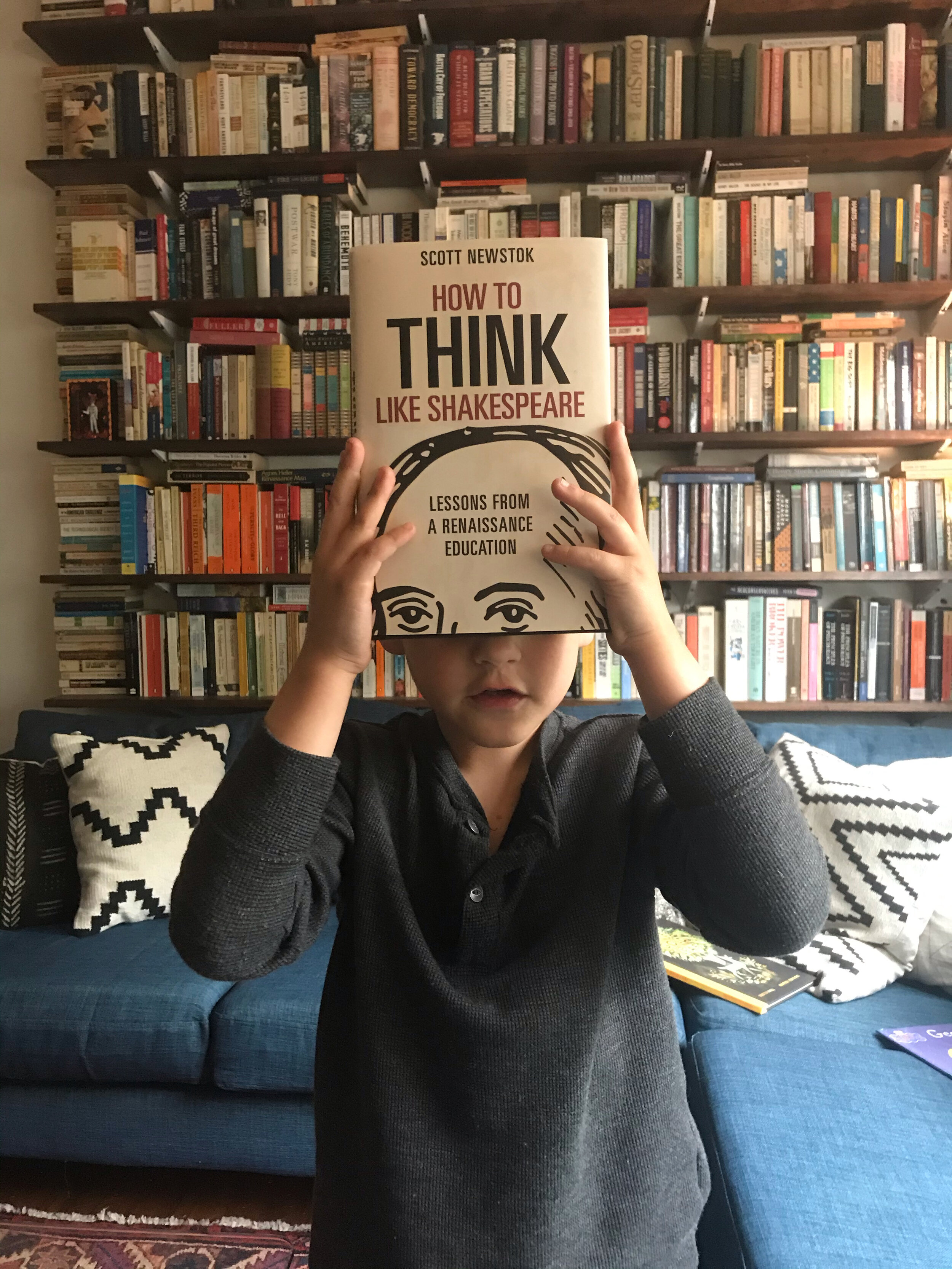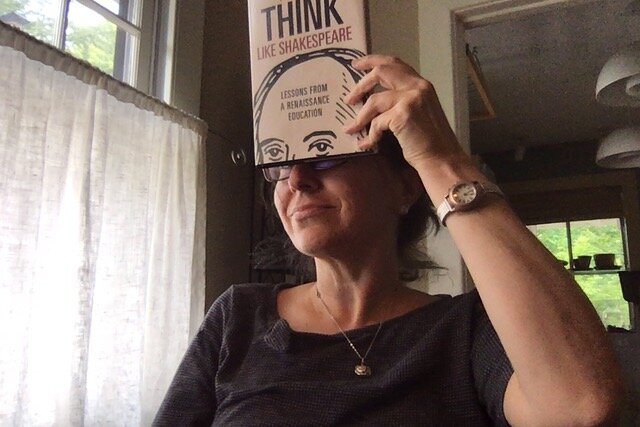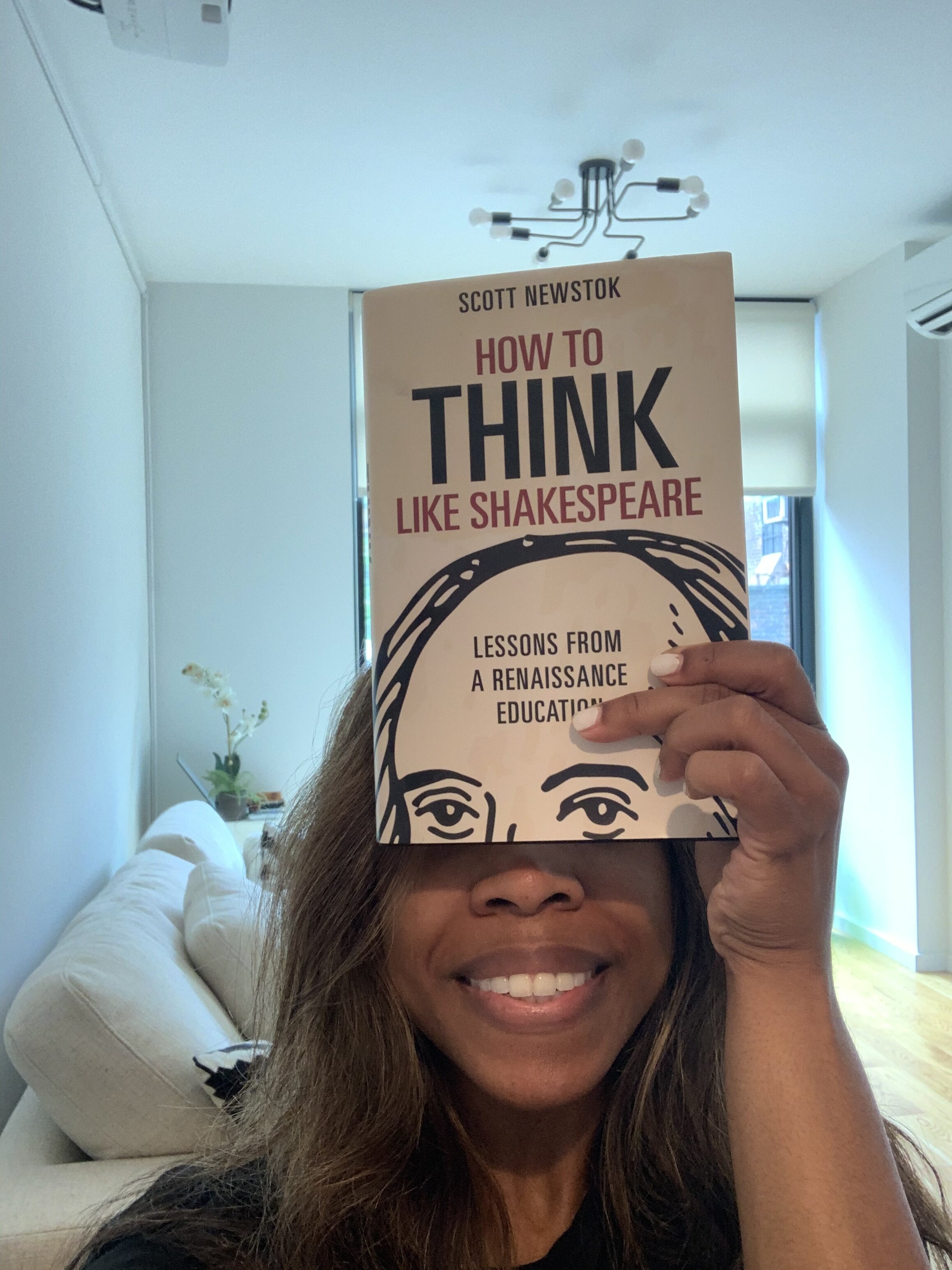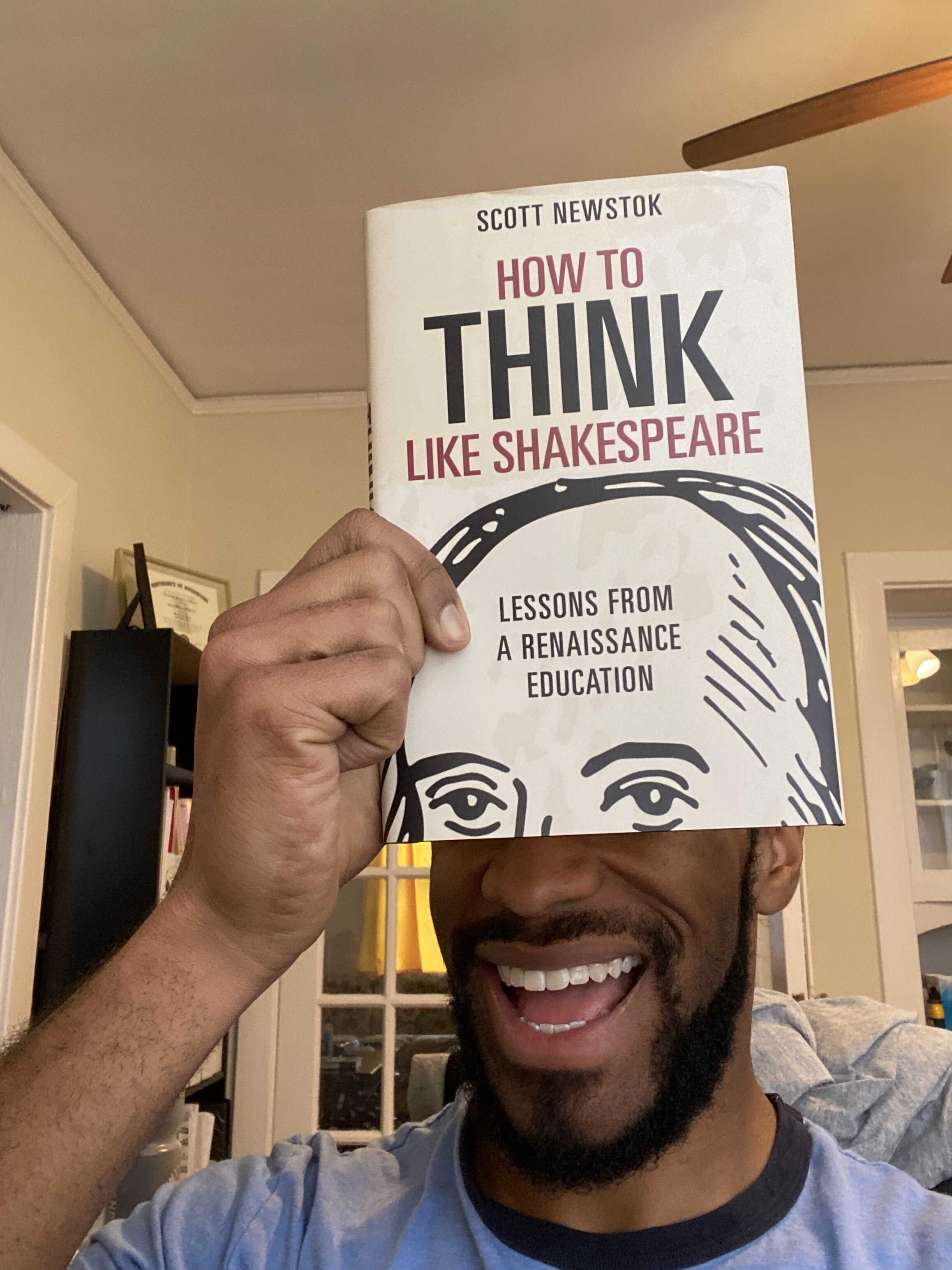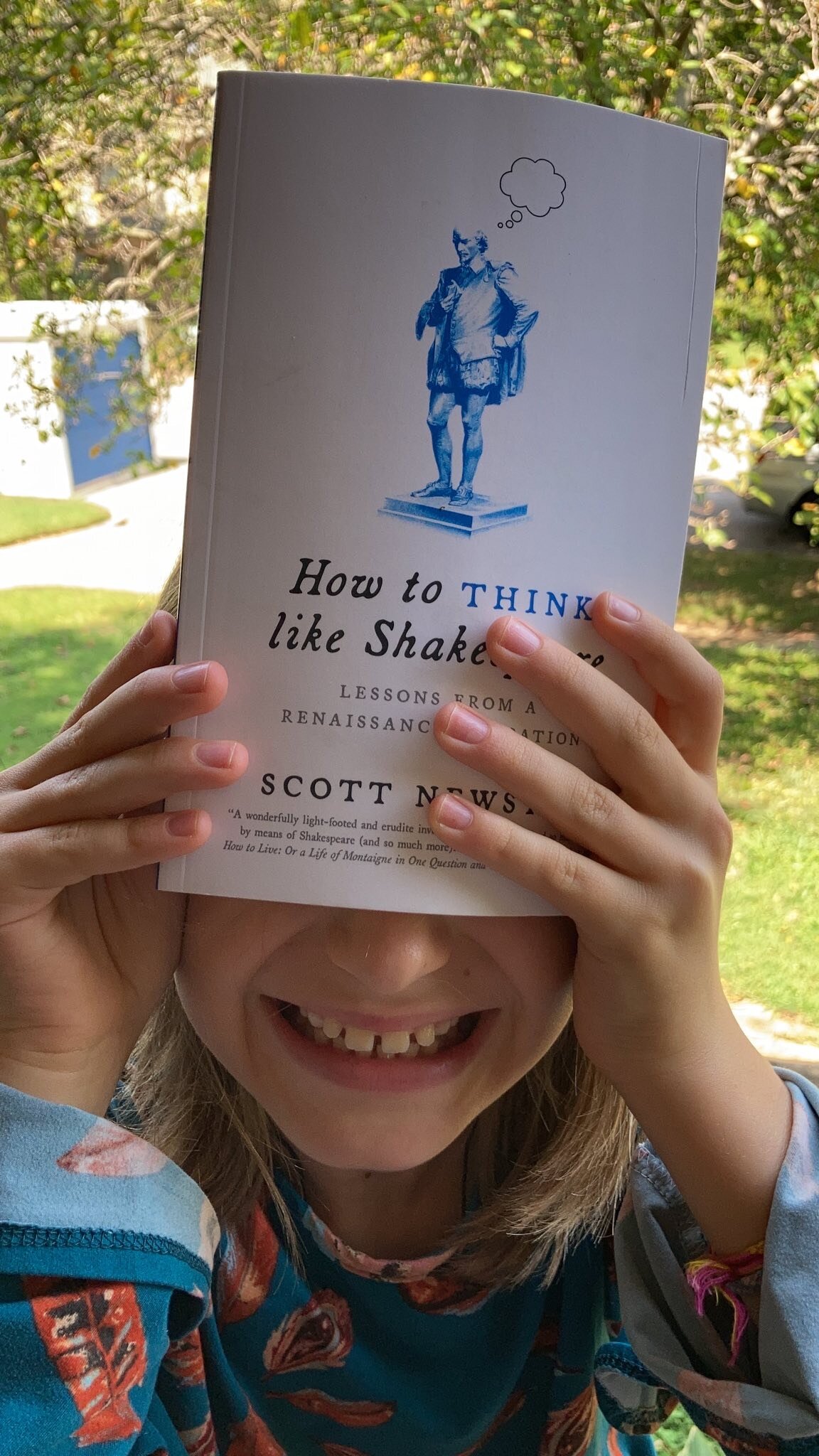How to Think like Shakespeare is my love letter to the craft of thought — pondering what we’ve lost in education today, and how we might begin to recover it.
Princeton University Press
In fourteen brief, lively chapters that draw from Shakespeare’s world and works, and from other writers past and present, How to Think like Shakespeare distills vital habits of mind that can help you think more deeply, write more effectively, and learn more joyfully.
Challenging a host of today’s questionable notions about education, I show how mental play emerges through work, creativity through imitation, autonomy through tradition, innovation through constraint, and freedom through discipline. It was these practices, and a conversation with the past — not a fruitless obsession with assessment — that nurtured a mind like Shakespeare’s. Written in a friendly, conversational tone and brimming with insights, this book enacts the thrill of thinking on every page, reviving timeless — and timely — ways to stretch your mind and hone your words.
Praise
A wonderful new book.
— Martha Barnette, A Way with Words
How to Think like Shakespeare is a witty and wise incitement to shape our minds in old ways that will be new to almost all of us. By description and by imitation, Scott Newstok performs an improbable but delightful resurrection of five-hundred-year-old methods of engagement with words and thoughts. And hey: if they worked for Shakespeare, why shouldn’t they work for you?
— Alan Jacobs, author of How to Think: A Survival Guide for a World at Odds
A lucid, human, terrifically engaging call to remember our better selves and a supremely unstuffy celebration of what’s essential.
— Pico Iyer, author of The Art of Stillness: Adventures in Going Nowhere
Ranging widely from the classics right up to the present with apt quotations, all in service of ideas we lose at our peril, How to Think like Shakespeare winningly blends respect for tradition with thoughtful steps toward a more equitable society. It is the work of a Renaissance man in both senses.
— Robert N. Watson, author of Cultural Evolution and Its Discontents: Cognitive Overload, Parasitic Cultures, and the Humanistic Cure
Splendid, tremendously clever, and obviously inspired by a real love of Shakespeare. The whole basic idea is terrific, with wonderful passages to illustrate each new idea. Bravo!
— Ken Ludwig, author of How to Teach Your Children Shakespeare
How to Think Like Shakespeare is not the work of an activist militating for his cause but a thinker reveling in his work. Newstok reminds us that this work is, above all, fun, and the calling on display is infectious.
— Karl Schuettler, A Patient Cycle
Hugely illuminating and insightful. It should be obligatory reading for all involved in education.
— David Crystal, co-author of Shakespeare’s Words
Conversationally warm and shot through with sudden connections and piercing insights . . . reading the book is a singularly convincing lesson in the very style the book is proposing as being the ideal way to learn.
— Andrew Muir, author of The True Performing of It: Bob Dylan & William Shakespeare
A fun educational tool . . . easy to digest, and the style of writing is fairly easy to follow as well. It reads like a conversation (if you annotate your book) with a very well-read friend who is sharing some ideas with you. . . . If you are looking for a book to make you think, I would highly recommend Scott Newstok’s How to Think Like Shakespeare.
— Bailey Cavender, The Educator’s Room
How to Think like Shakespeare takes the reader on a wild ride through histories of thought and habits of mind. The soil is rich and dense — much like the work of Shakespeare . . . thought stretches across areas as diverse as sociology, neuroscience, literature, languages, history, philosophy and so much more — as it should. I feel dizzy while reading and my to be read list is growing with each page.
— Jessica Manuel, Book Oblivion
Heavily but delightfully peppered with great quotes from great minds throughout history, How to Think like Shakespeare makes for a thoroughly enjoyable read. . . . through metaphor and wit, it makes just as compelling an argument as you’d expect from a mathematical proof. . . . All in all, this is a book I couldn’t do justice in any way in a simple review. Newstok has a deep and wide-ranging knowledge of literature, insight into why words have power, and an understanding of how to craft them. It presents valuable ideas in an engaging format, and will help you understand both our education systems and your own mind better.
A book that caused me to think and is still nagging at me to continue thinking. . . .The book is one that that will stick with you at the edge of your mind and encourage dabbling.
— Andrew Spencer, Ethics and Culture
A delight to read, the kind of book to carry with you and read in spare moment. . . . this book on education is a bit of an education itself.
— Benjamin Myers, Oklahoma Baptist University
"Newstok has done a remarkable job of bringing together centuries’ worth of thinkers, putting them into conversation, and inviting us to join in”
— Jenny Rebecca Rytting, SMART: Studies in Medieval and Renaissance Teaching
Scott Newstok argues persuasively for a return to some of the pedagogical methods that proved so effective in the 1500s.
— Paul Muldoon, Times Literary Supplement
Scott Newstok has written an urgent account of Renaissance education and our own impoverished equivalent. Learned, pacey, full of witty observation — I loved the idea of thinking as humanity’s ‘killer app’ — it is a brilliant enactment of its own central ideas about the importance of liberated thinking and the constitutive pleasures of rhetoric. The chapter titles recall Bacon and Montaigne, essayists of Shakespeare’s time: Newstok is their worthy successor.
— Emma Smith, author of This is Shakespeare
Insightful and joyful, this book is a masterpiece. It invokes and provokes rather than explains. It reminds rather than lectures. It is different from any book I have ever read. And it works. Drawing on the past in the best sense of the term, it reminds us that we are part of a long tradition. Few books make the case for liberal education as creatively as this one does.
— Johann N. Neem, author of What's the Point of College? Seeking Purpose in an Age of Reform
Scott Newstok’s latest book, How to Think Like Shakespeare, could be just the game changer the teacher (and administrator should have) ordered. . . . I couldn’t help but be won over by his earnest enthusiasm for the subject and ended up wanting to hear still more.
— Robert M. LoAlbo, PlayShakespeare.com
A lively and evocative new volume . . . a beautifully written, succinct description of educational principles derived from the best features of a renaissance education. The book is “deliberately short,” but packed with quotations from the Bard and scores of great authors, all combined to make us think – and, with a little luck, to think more like “our myriad-minded Shakespeare.” I highly recommend Newstok’s book for its pith, clarity, and insight – and the sheer breadth of its bibliography, including delightful footnotes, a bibliographic essay, and an index of Shakespearean cornucopia.
— Robert Jackson, Institute for Classical Education
The author’s enthusiasm, a comprehensive coverage of his subject matter, and the common sense inherent in his value judgments, work together to whip up a likeminded enthusiasm in his readers. . . . no one can deny the passion, the brilliance of the thought, the cogency of the argument, and the depth and breadth of the writer’s knowledge.
— Ian Lipke, Queensland Reviewers Collective
Great energy and clarity . . . entertaining throughout: the writer convinces us that he is learning with us, that we are learning with him . . . One of the great features of this eloquent, uplifting, enthusiastic yet realistic and beautifully produced book is its strong sense of moment.
— Tony Voss, Shakespeare in Southern Africa
Its surface pleasures take the shape of an inviting complexity of argument, quotation, and enthusiasm that dress a body of learning in bright colors of conversation; its deeper reward is nothing less than a stance toward life, and a mode of making meaning, that is by turns practical and profound. . . . An uncommon commonplace book, a convivial defense of liberal education, and a toolbox of practices and inspirations, How to Think Like Shakespeare is flirtatious in its learning and altogether captivating.
— Jim Mustich, author of 1000 Books to Read before you Die
A slim, surprising exploration of the value that deeply human engagement has in a world full of data points and distractions.
How to Think Like Shakespeare playfully juxtaposes early modern and contemporary habits of thought by way of wide-ranging examples. . . . thought-provoking and enjoyable, it’s the type of book that I would like to recommend to my university students to read for pleasure — precisely because it is brief and lively and could easily engender serious reflection about how we think.
The single best book I ever read on understanding Shakespeare's mind!
— Jacopo della Quercia, author of License to Quill
A lovely little book.
— Phillip Dolitsky, First Things
How to Think Like Shakespeare dangles insights woven from dozens of sources and it enticed me to try to think in ways toward which it gestures, to turn and assemble them, to sit at this table and be touched by the unexpected in the well-known.
— William West, Studies in English Literature
It’s short and sweet. It’s lovely — a beautiful little book.
With crisp, lapidary prose, Newstok writes authoritatively about the educational norms and practices that helped shape Shakespeare’s mind. . . . As Newstok essays the contours of a Renaissance education, he demonstrates with verve the effect it’s had on his own thinking. Put otherwise, the book is Newstok’s essay at thinking—and it’s a sterling attempt. . . . It will be of interest to any reader or teacher of Shakespeare—and it should be of interest to any serious reader or teacher. Watching Newstok think with Shakespeare is inspiring, and he proves an amiable guide. — Nathan M. Antiel, Principia: A Journal of Classical Education
A fine, playful new book . . . it is delightful to read. . . . The elegance of the physical book, each essay/chapter prefaced with a gorgeous image that comments on its subject matter . . . embodies the artisanal practice Newstok celebrates, as does the craftiness of his own style . . . its method is exuberantly positive.
— Elizabeth Hanson, Shakespeare Studies
A wonderfully light-footed and erudite investigation of education (and so much more), by means of Shakespeare (and so much more). Scott Newstok’s book, a playful delight, also delivers a serious pedagogical punch.
— Sarah Bakewell, author of How to Live: Or a Life of Montaigne in One Question and Twenty Attempts at an Answer
A beautiful study of how we learn, why we write, what our education is for — and by “we,” I mean everyone. Lovely book for anyone who wants to write, read, think better . . .
— Arthur Phillips, author of The King at the Edge of the World
Scott Newstok’s How to Think like Shakespeare is something to treasure. The book lays out a case for Shakespeare’s vital connection to the lives we live today, opening the door to new ways of thinking and experiencing the world, which are essential to a life well lived.
— Michael Witmore, director of the Folger Shakespeare Library
As a concise history of Western pedagogical development, How To Think Like Shakespeare succeeds beautifully. . . . By the end of How To Think Like Shakespeare, [Newstok] has us thoroughly convinced. To think and create effectively requires one to train and practice. By apprenticing ourselves to the past, we can ourselves become links in the glorious chain of human intellectual achievement.
— Fernanda Moore, Chapter 16
This is a little gem of a book. It builds on a brilliant piece that appeared in The Chronicle of Higher Education a couple of years ago, but goes far beyond its scope. It combines an exploration of Humanist ideas of education with a devastating critique of the disease of managerialism that has invaded so many parts of our life, including education. Among other things, it offers the pleasures of a modern commonplace book, brimming with so many choice thoughts that you feel the urge to scribble them down. The book is written with elegance and wit; the last chapter in particular is a tour de force.
— Indira Ghose, University of Fribourg, Switzerland
This delightful book is an odd treasure. . . . [it’s] an educational manifesto that should make for better people, better schools, colleges and universities, and better social relations between and among free citizens. There is a potential revolution in this odd treasure of a little book. Give it to some of your colleagues, if you think it isn't too late for them, but give it to all of your students. Let them know what they may have been missing – before it is too late.
— Scott Crider, Ben Jonson Journal
What a joy it was to read a book about Renaissance literature and education that not only describes these things with full respect for their historical peculiarities, but also entertains the idea that they belong (or could belong) to us in the present, as equipment for living! And what a pleasure to read essays rather than articles! . . . an achievement worthy of celebration . . . I thoroughly enjoyed this book and recommend that anyone who cares about teaching and learning read it again and again.
— Sean Keilen, Cahiers Élisabéthains
A lucid, attractive essay that wears its learning lightly and with style. . . . How to Think Like Shakespeare would have been a good book at any time; now it is a necessary one.
— David Randall, Academic Questions
A bracing, witty argument for a pedagogy that is at once old and new. . . . what he demonstrates in his playful, infectiously enthusiastic pages is a more modest and more proximate idea of freedom: the kind that appears in the sheer joy of reading and learning.
— Samuel Fallon, Renaissance Quarterly
If to think like Shakespeare may appear as an arduous if not impossible task, thinking with Shakespeare, trying to absorb the complexity of his reasoning, would be a good enough exercise in nuanced thinking and daring creativity.
— Gabriela Dragnea Horvath, Voyages Journal of Contemporary Humanism
Newstok’s passion for his subject comes across to the reader throughout the book.
Words, words, words
Awards and Book of the Year
Times Literary Supplement Book of the Year, Paul Muldoon
Shortlist, Memoria College's Parnassus Prize
Finalist, Professional and Scholarly Excellence (PROSE) Awards, Association of American Publishers (AAP)
Nominee, Frederick W. Ness Book Award, American Association of Colleges & Universities
Nominee, Grawemeyer Award for Education, University of Louisville
Nominee, Teaching Literature Book Award, Idaho State University
Nominee, Falstaff Book Award, PlayShakespeare.com
A Few of My Favorite Things, Stephen J. Anderson
Humanities Books of the Year, David Auerbach
Non-Fiction Books of the Year, Julian Girdham
Memorable Reading from 2020, Timothy Huebner
My Favorite Reads of 2020, David Wells
Audio Book
Narrated by Gabriel Vaughan (founding member of the Tennessee Shakespeare Company) for Tantor Media — available on libro.fm (which shares revenue with local bookstores), audiobooks.com, audible.com, Google Play, Recorded Books
Essays
How to Speak with Shakespeare — The First Person (TFP) with Michael Judge
Well, Shakespeare, He’s in the Alley — The First Person (TFP) with Michael Judge
Letting Hamnet Net Hamlet — The Shakespeare Newsletter
By Going Virtual During the Pandemic, We’ve Lost Our Sense of Place — Dallas Morning News
Suggestions for First-Year Seminars
How to Think like a Hypocrite: A Letter to My Children — Nexus Institute
The Best Books on Shakespeare’s Sonnets — with Sophie Roell for Five Books
Of Craft — Institute for Classical Education
What’s Past is Prologue (Preface) — Resilience.org
James Baldwin on Shakespeare — LitHum
A Brief Note on Riots and Shakespeare — No Sweat Shakespeare
We Would All Do Well to Think More Like Shakespeare — Dallas Morning News
Happy Birthday, Bob Dylan — LinkedIn
How to Think like a Sonnet, or, Fourteen Ways of Looking Around a Room — Shakespeare & Beyond, Folger Shakespeare Library
Lorraine Hansberry on Shakespeare — LinkedIn
Happy Birthday Shakespeare! — The Book Haven
How to Think like Shakespeare (Quarantine edition) — LinkedIn
Of Conversation — Shakespeare & Beyond, Folger Shakespeare Library
The Page 99 Test — Campaign for the American Reader
Remote — But Close — Rhodes College
Of Thinking — Princeton University Press preview
The Truth about Shakespeare in Duluth — Perfect Duluth Day
How to Think like Shakespeare — The Chronicle of Higher Education
The Crafts of Freedom — Chapter 16
A Plea for ‘Close Learning’ — Inside Higher Ed
Interviews
New Books Network — Justin McGeary
The Arts of Language — Andrew Pudewa
Old Books with Grace — Grace Hamman
Recovering the Lost Art of Thinking in Education, with David Hogsette and Selina Lai-Henderson
Friday Features — Mars Hill Audio
Plague, Power, and Poetry - PBK Triennial 2021, with Katherine Steele Brokaw, Ruben Espinosa, and Ayanna Thompson
Mechanics’ Institute — Taryn Edwards
Virtual Memories Show — Gil Roth
Read More Books — Jeremy Anderberg
How to Think like Marlowe: Orson Welles’s Detour from Shakespeare — Shakespeare Birthplace Trust with Paul Edmondson
The Good Life Podcast — Sean Murray
How and Where I Write — David Moore
EdSurge — Rebecca Koenig; reposted at StayCurious
The Art of Manliness — Brett McKay
This is Not a Pipe — Chris Richardson
Shakespeare for All — Maria Devlin McNair
Works of Genius — Michael Goldberg’s Stay Human program on KAXE radio
Historically Thinking — Al Zambone
Innovation Talk — Michael Lester
The Stage Show — Michael Cathcart
bUneke radio — Mary Brotherton and Gene Albertson
Thinking to Be Wise — Paul Massari for Colloquy, Harvard’s GSAS alumni magazine
Christian Humanist — Nathan Gilmour
A Conversation with Andrew Hui, Zena Hitz and Scott Newstok
UCI New Swan Shakespeare Center — Julia Lupton
That Shakespeare Life — Cassidy Cash
The Morning Show — KAXE Northern Community Radio with Heidi Holtan and John Bauer
The Nearness of Shakespeare’s Thinking — Timothy Kircher, Humanities Watch
Advice to Writers — Jon Winokur
State of Shakespeare — James Elliott and Gerritt VanderMeer
Look Another Way — with Emma Smith, James Shapiro, and Theatre for a New Audience founding director Jeffrey Horowitz
LitHub — roundtable with Vanessa Corredera, James Shapiro, Emma Smith, and Jeffrey R. Wilson
The Chronicle of Higher Education
Reviews
Principia: A Journal of Classical Education — Nathan M. Antiel
Shakespeare Studies — Elizabeth Hanson
Studies in English Literature — William West
All Manner of Thing — Craig Burrell
Fortnightly Review — Anthony O’Hear
Socrates - Head of School — Mark Engstrom
The European Legacy — Oren Harman
Bard Blogger — Charlotte Gehring
ATTENTION — Ronald K. L. Collins
The Little White Attic — Hai Di Nguyen
Cocreatively Thinking — Willis Jensen
Voyages Journal of Contemporary Humanism — Gabriela Dragnea Horvath
Ethics and Culture — Andrew Spencer
Learning Strategies — Larry Davidson
Renaissance Quarterly — Samuel Fallon
Soldiers and Civilization — Reed Bonadonna
Word.Image.Design — Simon Nazer
Better Thinking & Incentives: Lessons From Shakespeare — Farnam Street
Academic Questions — David Randall
A Book Owl’s Corner — Naemi Fischer
Cahiers Élisabéthains: A Journal of English Renaissance Studies — Sean Keilen
In the Company of Books — Jim Mustich
Teachers College Record — Melissa Johnson
To Think or Not to Think — Aaron J. Brown
Nuova informazione bibliografica — Gilberta Golinelli
Ripe Good Scholar — Sarah Plaskett
This Ain’t the Lyceum — Kelly Mantoan
Tweetspeak Poetry — Glynn Young
Moreana — Christopher D. Schmidt
Thinking Like Shakespeare – Today — Shakespeare in Southern Africa, Tony Voss
Yale Historical Review — London Johns
San Francisco Book Review — Axie Barclay
Get Your Shakespeare On — Thomas C. Foster
Thinking, Writing, Reading, Teaching — Julian Girdham
Innovation Through Constraint — University Bookman, Matthew Stewart
Space Station Mir — Miriam Laufer
The Educator’s Room — Bailey Cavender
Ben Jonson Journal — Scott Crider
The Northern Review of Books — Alan Dent
Bringing Back the Art of Thinking — Standpoint India, Sakshi Shivpuri
Renaissance Education for our Time — Bad Assessment, Erik Gilbert
Australian Book Review — David McInnis
Shakespeare Geek — Duane Morin
No Sweat Shakespeare — Ralph Goldswain
What Is College For? — Inside Higher Ed, Steven Mintz
La vocación intelectual — El debate de hoy, Joshua P. Hochschild
In Search of Shakespeare’s Mind — Los Angeles Review of Books, Daniel Blank
The Key Reporter — Louis J. Kern
The American Conservative — Casey Chalk
Tes (Times Educational Supplement) — Victoria Addis
Mine Eyes Be Blessed Made — Fourteen Lines, Tom Fry
The Intellectual Vocation — First Things, Joshua P. Hochschild
sententiae antiquae, Erik Robinson
Yak Shaving — A Way With Words radio (review excerpt)
Giving new validity to old form — Andrew Muir
Queensland Reviewers Collective — Ian Lipke
Institute for Classical Education — Rob Jackson
A Patient Cycle — Karl Schuettler
Chapter 16; Commercial Appeal —Fernanda Moore
PlayShakespeare.com — Robert M. LoAlbo
Scott Newstok’s 2020 Book about Renaissance Education and Walter J. Ong’s Thought — Thomas Farrell
Cameos
What Progressive Educators Get Wrong about Education — Daniel Buck
Close Reading — some recent work
Imitation as Progress — Learning to Write — John Nielsen
For the love of memorization — Daniel Buck
A Winter Break Reading List on Skills for Scholars — James M. Lang
The best books about thinking — Shepherd
Teacher Guide for The Tempest — Core Knowledge Foundation
Why Renaissance Educators Were “Incredibly Invested” in the Verbal Arts — Richard Rabil, Jr.
The best books on Shakespeare's shelf to grow your mind & your garden — Gerit Quealy
Shakespeare Festival Reads — Left Bank Books
Substack Reads: Inside Top Gun, pigeon keeping in NYC, and what Shakespeare taught Dylan
Human Fundamentals — Commonweal Magazine
Shakespeare’s Education and What It Teaches Us — Duncan Driver
7 Best Books for Intellectual Growth
Wylie High School — Caitlin Waits
Catholic School Matters — Timothy Uhl
Civic Renaissance — Alexandra Hudson
Support for Teaching — Rhodes College
Marveling at Shakespeare’s Work: What If the Texts Were the Standards? — John Robert Reynolds
The Month in Books — Nerdishly
A Closer Look at “Skills for Scholars”
High Minded Self-Help! Enriching life through deep thought
Why Johnny Can’t Think — Rob Jenkins
Words Matter – 7 Takeaways for July 11, 2021
The Capacity to be Alone – 7 Takeaways for June 13, 2021
Education Must be About Thinking – 7 Takeaways for June 6, 2021
Instructional Materials for Wayne Smith's courses
Summer Reading List — Phi Beta Kappa
Revolutions of Virtues: Revisiting the Underpinnings of Rhetorical Education — Eric Reid Hamilton
Phillips Academy Andover 2021 summer reading list — Michael Legaspi
St. John’s College Bookstore — Education
Shelf Awareness — Robert DiYanni
Less Wrong Recommended Reading
Ripe Good Scholar — Sarah Plaskett
Education | Academic Best Sellers — Library Journal
By the Time You Read This, We Will Already Be Dead — Maria Ugas
¿Generaciones perdidas? Parte II; Parte II— Luisa Fernanda Pasillas Pliego
How to Think like Ira Aldridge
Dana Gioia on Learning, Poetry, and Studying with Miss Bishop
Common reading when dorm rooms become dorm Zooms
Common Reading; Princeton University Press catalog
You are What You Read — Robert DiYanni
Constrained Writing: It’s a Thing!
To Learn to Desire to Learn: On Shakespeare and Education
Five Books for Shakespeare Lovers, or Those Who Want to Be: Doorways In
In the Company of Books — James Mustich
Only the brave launched books in 2020 — George Anders
Books for Readers with Big Questions — Princeton University Press
Debugging the Grace of Great Things with Kafka and Other Great Writers — John Robert Reynolds
The Paradoxes of Liberal Learning: From Aphthonius to Shakespeare to Bob Dylan — podcast discussion of the book with my generous friend Clinton Brand.
Top 10 Best Shakespeare Literary Criticism of 2020
Prufrock — Daily newsletter on books, art, and ideas.
Critical Thinking in Psychology — Ron Sheese
15+ Best Books for Teachers — Ali Kaya, Abakcus
Shakespeare Festival — Thrift Books
Public Shakespeare — Jeffrey R. Wilson
7 Best Books for Intellectual Growth — Lost in Book
Swiss Association of Medieval and Early Modern English Studies
A Compendium of Recent Research and Books of Interest to Higher Education Professionals — The Council of Independent Colleges (CIC)
How to Think Like . . . — GoodReads
The Elm — Washington College student newspaper, Sophie Kerr lecture series
Long Distance Call — podcast with Eliza Harvey and Geraldine Doogue
The South Roan Agrarian — Winged Elm Farm
The Thrill of Thinking — online seminar offered by Clinton Brand
Alumni Updates — Graduate School of Arts and Sciences
Why Smart Satire Soothes the Psyche — Ian Warden, Canberra Times
The Critic’s Notebook — The New Criterion
Historically Thinking podcast
Skills for Scholars — Princeton University Press
National Association of Independent Schools (NAIS)
Interview with Zena Hitz — Athwart
(Roughly) Daily — Lawrence Wilkinson
Inspire Thought — Princeton University Press
Shakespeare’s Lifetime — The Best of Shakespeare
Saturday Morning Reading Recommendations — Benjamin McEvoy
We made 2020. How do we make the future from here? — Maitri Erwin
Recent Books with Harvard Connections — Harvard Magazine
Paper Kingdoms 4 — Adam G. Hooks interviewed by Benjamin Higgins
Spotlight on Lifelong Learning — Laura Loth, WKNO
Book Oblivion — Jessica Manuel
Fifteen on Friday — David Wells
High School Graduation Gifts — Unique Gifter
Suddenly they all died. The end. — Kay Kauffman
Home, Holding the Pen — James Diedrick
What We Are Reading Today — Arab News
Liberal Arts Seminar, Asbury University
About Masks (Plus a personal note at the end) — David R. Kotok


